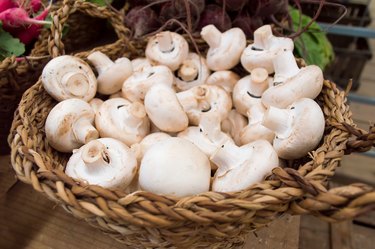
Vitamin K fills such an important role in blood clotting and maintaining strong bones that you shouldn't limit the amount you eat unless it's under the advice of your physician. If you're at risk for blood clots or you take blood-thinning medications, it's vital to monitor your consumption of vitamin K, but chances are you won't need to worry about eating only the very few vegetables that contain no vitamin K.
Why Watch Vitamin K
Video of the Day
Vitamin K is essential for the synthesis of four of the 13 proteins your body uses to clot blood, according to the Harvard School of Public Health. If you take blood thinners such as warfarin, it's important to keep track of the vitamin K in your diet because it counteracts the effect of the medication, according to the University of Arizona. The Linus Pauling Institute reports that people taking warfarin should usually consume their recommended daily intake: 90 micrograms for women and 120 micrograms for men. That decision should be made together with your physician, however.
Video of the Day
Keep Vitamin K Balanced
Warfarin is so sensitive to vitamin K that your blood may become too thin if you don't get enough. On the other hand, if you take warfarin and consume large amounts of vitamin K, it may cause blood clots, according to the University of Arizona. Either extreme can lead to life-threatening complications. When your doctor prescribes warfarin, the dose you need will vary according to the amount of vitamin K in your diet. You may not have to give up vegetables that are high in vitamin K, such as green leafy vegetables, as long as you consistently eat the same amount at each meal to keep blood levels balanced.
Vegetables With No Vitamin K
You won't find many vegetables that contain absolutely no vitamin K. The U.S. Department of Agriculture's National Nutrient Database reports that 1 cup of canned corn, 1 cup of bamboo shoots and 1 tablespoon of shallots and frozen, chopped onions contain zero micrograms of vitamin K. A 1-cup serving of a variety of mushrooms also has no vitamin K, including white, shiitake, maitake and portabella mushrooms. If you include vegetables with 0.1 to 0.9 microgram per serving, you can also add 1 cup of turnips, parsnips, rutabaga, kohlrabi, canned beets and boiled corn to the list. One-half cup of baked potato also has less than 1 microgram of vitamin K.
Choices Low in Vitamin K
As long as your serving of vegetables has no more than 5 micrograms of vitamin K, it supplies 5 percent or less of your recommended daily intake. By comparison, the University of Michigan defines low sources of vitamin K as foods that supply 30 micrograms or less per serving or per 100 grams. If you add vegetables that provide no more than 5 micrograms per serving, your choices expand to include squash, potatoes, sweet potatoes, eggplant, carrots, green peppers and succotash.
- Bastyr University: Vitamin K for Bone Health
- Harvard School of Public Health: Vitamin K
- University of Arizona: Dietary Considerations in Coumadin Patients
- University of Michigan Health System: Warfarin (Coumadin) and Your Diet
- USDA National Nutrient Database: Nutrient Lists: Vitamin K: Vegetables and Vegetable Products
- Linus Pauling Institute: Vitamin K: Safety